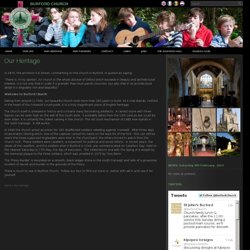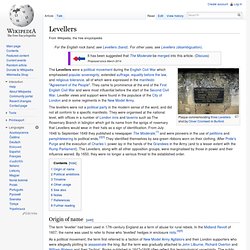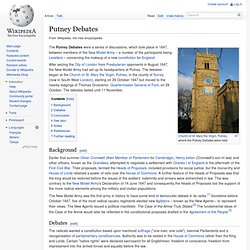

Burford Church. In 1870, the architect G.E.Street, commenting on the church in Burford, is quoted as saying; "There is, in my opinion, no church in the whole diocese of Oxford which exceeds in beauty and architectural interest.

It is not only that in scale it is grander than most parish churches, but also that in its architectural detail it is singularly rich and beautiful. " Welcome to Burford Church Dating from around 1175AD, our beautiful church took more than 300 years to build. British Civil Wars, Commonwealth and Protectorate, 1638-60. Levellers. The Levellers were a political movement during the English Civil War which emphasised popular sovereignty, extended suffrage, equality before the law, and religious tolerance, all of which were expressed in the manifesto "Agreement of the People".

They came to prominence at the end of the First English Civil War and were most influential before the start of the Second Civil War. Leveller views and support were found in the populace of the City of London and in some regiments in the New Model Army. Origin of name[edit] The term 'leveller' had been used in 17th-century England as a term of abuse for rural rebels. In the Midland Revolt of 1607, the name was used to refer to those who 'levelled' hedges in enclosure riots.[4][5] Political ambitions[edit] The Levellers' agenda developed in tandem with growing dissent within the New Model Army in the wake of the First Civil War. Timeline[edit] The soldiers in the New Model Army elected "Agitators" from each regiment to represent them. Putney Debates.
The Putney Debates were a series of discussions, which took place in 1647, between members of the New Model Army – a number of the participants being Levellers – concerning the makeup of a new constitution for England.

After seizing the City of London from Presbyterian opponents in August 1647, the New Model Army had set up its headquarters at Putney. The debates began at the Church of St. Mary the Virgin, Putney, in the county of Surrey (now in South West London), starting on 28 October 1647 but moved to the nearby lodgings of Thomas Grosvenor, Quartermaster General of Foot, on 29 October.
The debates lasted until 11 November. Background[edit] Debates[edit] The radicals wanted a constitution based upon manhood suffrage ("one man, one vote"), biennial Parliaments and a reorganisation of parliamentary constituencies. The Putney Debates came about as a result of the publication of the Case of the Armie. And Ireton, for the Grandees: Conclusion[edit] See also[edit] Notes[edit] References[edit]